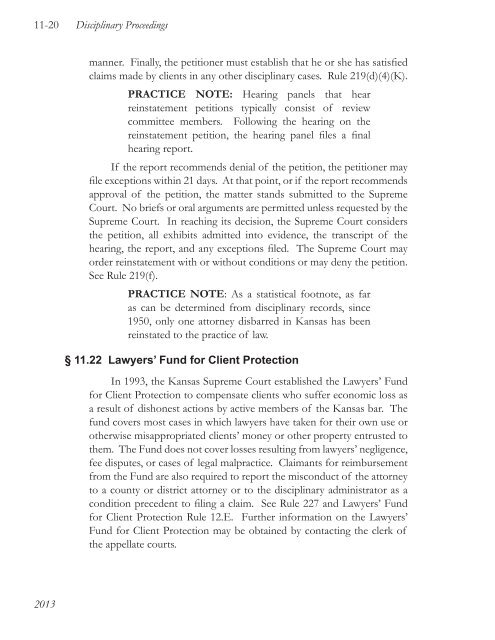CHAPTER 11 - Disciplinary Proceedings - Kansas Judicial Branch
CHAPTER 11 - Disciplinary Proceedings - Kansas Judicial Branch
CHAPTER 11 - Disciplinary Proceedings - Kansas Judicial Branch
You also want an ePaper? Increase the reach of your titles
YUMPU automatically turns print PDFs into web optimized ePapers that Google loves.
<strong>11</strong>-20 <strong>Disciplinary</strong> <strong>Proceedings</strong><br />
manner. Finally, the petitioner must establish that he or she has satisfied<br />
claims made by clients in any other disciplinary cases. Rule 219(d)(4)(K).<br />
PRACTICE NOTE: Hearing panels that hear<br />
reinstatement petitions typically consist of review<br />
committee members. Following the hearing on the<br />
reinstatement petition, the hearing panel files a final<br />
hearing report.<br />
If the report recommends denial of the petition, the petitioner may<br />
file exceptions within 21 days. At that point, or if the report recommends<br />
approval of the petition, the matter stands submitted to the Supreme<br />
Court. No briefs or oral arguments are permitted unless requested by the<br />
Supreme Court. In reaching its decision, the Supreme Court considers<br />
the petition, all exhibits admitted into evidence, the transcript of the<br />
hearing, the report, and any exceptions filed. The Supreme Court may<br />
order reinstatement with or without conditions or may deny the petition.<br />
See Rule 219(f).<br />
PRACTICE NOTE: As a statistical footnote, as far<br />
as can be determined from disciplinary records, since<br />
1950, only one attorney disbarred in <strong>Kansas</strong> has been<br />
reinstated to the practice of law.<br />
§ <strong>11</strong>.22 Lawyers’ Fund for Client Protection<br />
In 1993, the <strong>Kansas</strong> Supreme Court established the Lawyers’ Fund<br />
for Client Protection to compensate clients who suffer economic loss as<br />
a result of dishonest actions by active members of the <strong>Kansas</strong> bar. The<br />
fund covers most cases in which lawyers have taken for their own use or<br />
otherwise misappropriated clients’ money or other property entrusted to<br />
them. The Fund does not cover losses resulting from lawyers’ negligence,<br />
fee disputes, or cases of legal malpractice. Claimants for reimbursement<br />
from the Fund are also required to report the misconduct of the attorney<br />
to a county or district attorney or to the disciplinary administrator as a<br />
condition precedent to filing a claim. See Rule 227 and Lawyers’ Fund<br />
for Client Protection Rule 12.E. Further information on the Lawyers’<br />
Fund for Client Protection may be obtained by contacting the clerk of<br />
the appellate courts.<br />
2013

















